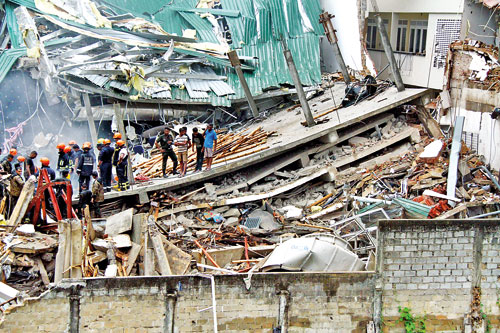Tough building code in Sri Lanka

File picture of the Wellawatte building collapse
The building code in Sri Lanka is pretty extensive so much so that it’s on par with the UK standards, industry experts say but the recent building collapse at Wellawatte has had the industry reeling with questions being raised about safety standards.
“Before any building plan is approved it has to be submitted to the UDA. Also over and above this, there are things such as cube tests till the project is completed – so the building code is pretty wide ranging,” Rohan Parikh CEO, Iconic Development told the Business Times. The building code essentially has extensive criteria to follow on the quality of steel and concrete. Standards pertaining to the construction of houses or buildings including what materials are to be used and technicalities pertaining to engineering are formulated by the Construction Industry Development Authority (CIDA). Hiroshini Fernando, CEO RIL which recently went public told the Business Times that the high rises are regulated and that there’s a stringent approval process when buildings them.
As the country has many high-rise structures coming up, incidents like the Wellawatte collapse will be a big blow to the construction industry, analysts say but a high-rise builder in Colombo said that this recent incident in mid-May hasn’t impacted his sales queries on apartment units.
The Institution of Engineers Sri Lanka (IESL) has said that it was conducting an inquiry into the structural engineer behind the construction of the collapsed building.
Echoing the same sentiment as Mr. Parikh, an Overseas Realty Ceylon PLC official told the Business Times that sales or queries for reputed builders haven’t dropped after this incident at Wellawatte. “People aren’t scared to approach reputed builders. But it may not be the same for the not-so-new ones,” he said. He added that it was mandatory for building owners, including those who owned high-rise buildings, to obtain the authorisation for their constructions from a recognised structural engineer appointed or nominated by the IESL. He said that despite stringent controls, if design requirements were disregarded in construction, anything could happen.
The current set of standards in the country prior to constructing a high rise according to both officials is high. “Current standards are on par with international standards, yet prices are lower. Sri Lanka has amongst the highest value for money in real estate,” Mr. Parikh said. According to him, the potential owner (of an apartment) can ask whether the law had been followed, plans have been approved, whether deeds can be obtained, insurance has been taken, if there are fire safety measures and if the Fire Brigade has the capability to reach the floor of the condominium he or she is thinking of buying.


